Commercial Solar Installers Charlotte
Find Commercial Solar Companies in Charlotte
Receive up to 3 Commercial Solar Energy quotes for your project today! Compare profiles, reviews, accreditations, portfolio, etc... and choose the best service.
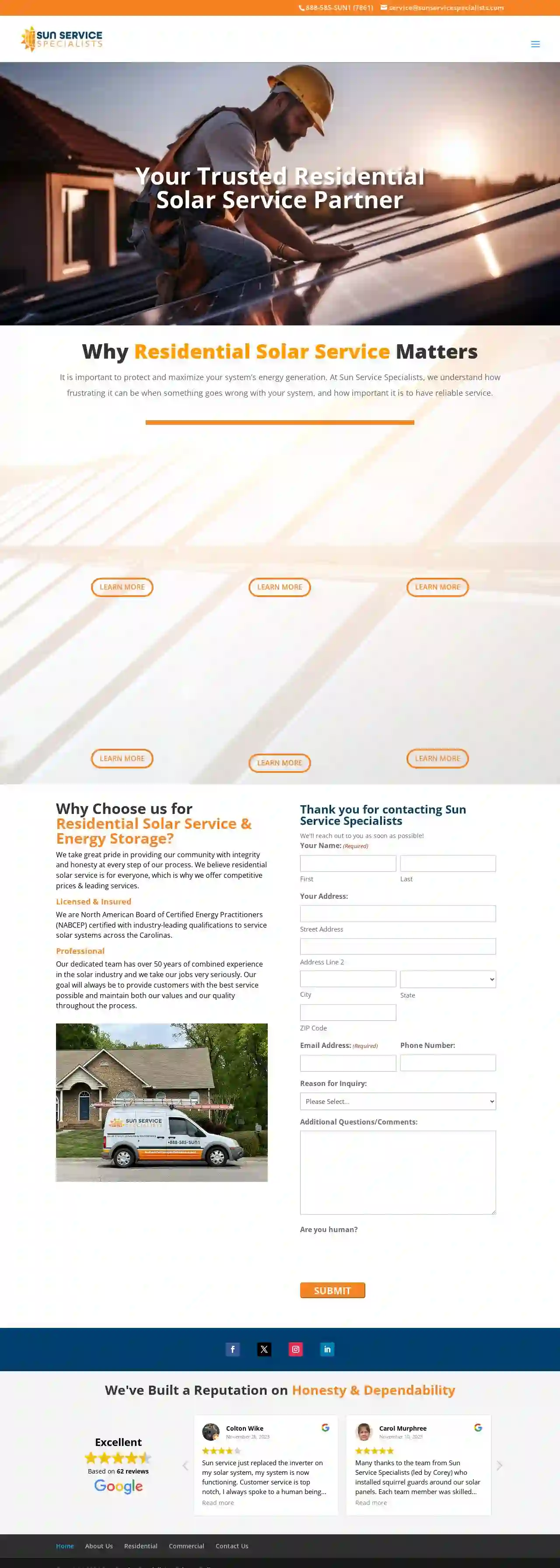
Sun Service Specialists
4.662 reviewsSuite 100, 1234 Solar Way, 28277, USSun Service Specialists is a leading provider of solar services, including installation, maintenance, and repair. With over 50 years of combined experience in the solar industry, our dedicated team is committed to providing customers with the best service possible. We are NABCEP certified and licensed and insured, ensuring that our customers receive the highest quality service.
- Services
- Why Us?
- Accreditations
- Our Team
- Testimonials
- Gallery
Get Quote
1st Solar
519 reviews123 Solar Way, Suite 100, Charlotte, 28205, US1st Solar is a leading solar energy company dedicated to providing sustainable energy solutions. With a mission to empower individuals, businesses, and communities to embrace renewable energy, they offer a range of services including solar system installation, ground-mounted systems, system maintenance, and more. Their team of seasoned professionals is committed to delivering top-notch service and results, making them a premier destination for all solar energy needs.
- Services
- Why Us?
- Accreditations
- Our Team
- Testimonials
- Gallery
Get Quote
8MSolar
5262 reviewsRaleigh NC, 5112 Departure Drive, Raleigh, 27616, US8MSolar is the highest rated solar panel installation company in North Carolina. We help install solar energy in North Carolina for homes, businesses and non-profits. We focus on installing Solar PV panel systems that are cutting edge, beautiful and reliable.
- Services
- Why Us?
- Accreditations
- Our Team
- Testimonials
- Gallery
Get Quote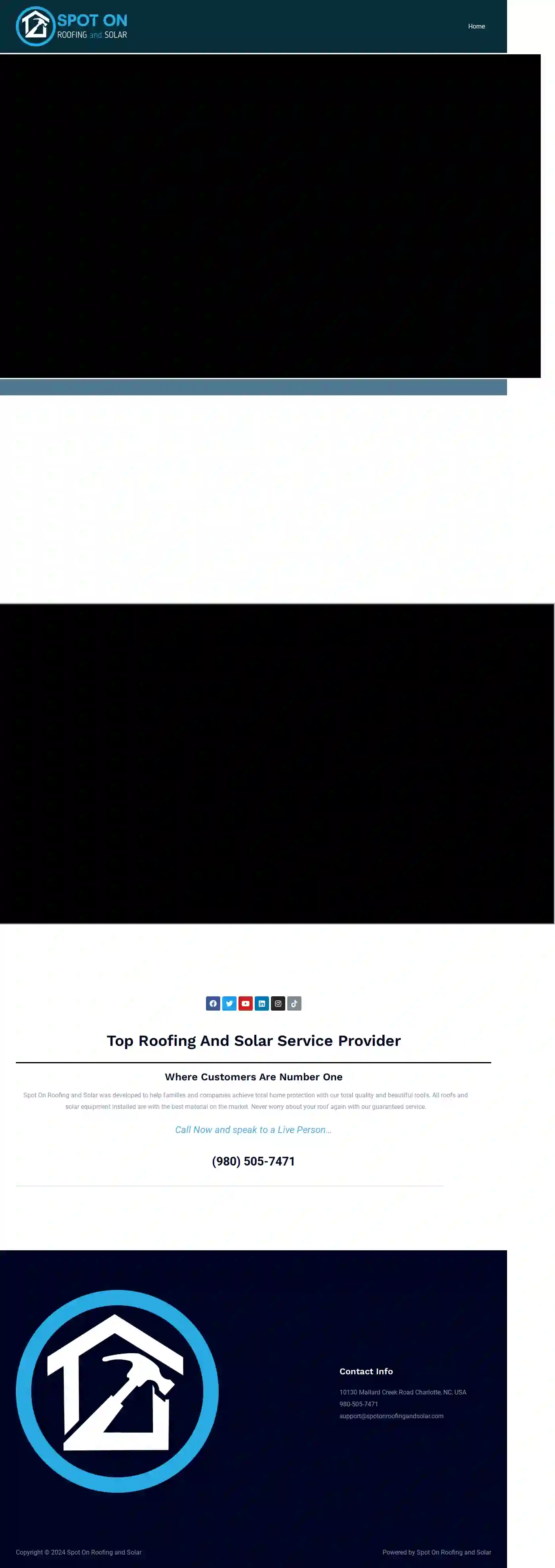
Spot On Roofing and Solar
514 reviews10130 Mallard Creek Road, Charlotte, NC, USA, 28262, USSpot On Roofing and Solar was developed to help families and companies achieve total home protection with our total quality and beautiful roofs. All roofs and solar equipment installed are with the best material on the market. Never worry about your roof again with our guaranteed service.
- Services
- Why Us?
- Accreditations
- Our Team
- Testimonials
- Gallery
Get Quote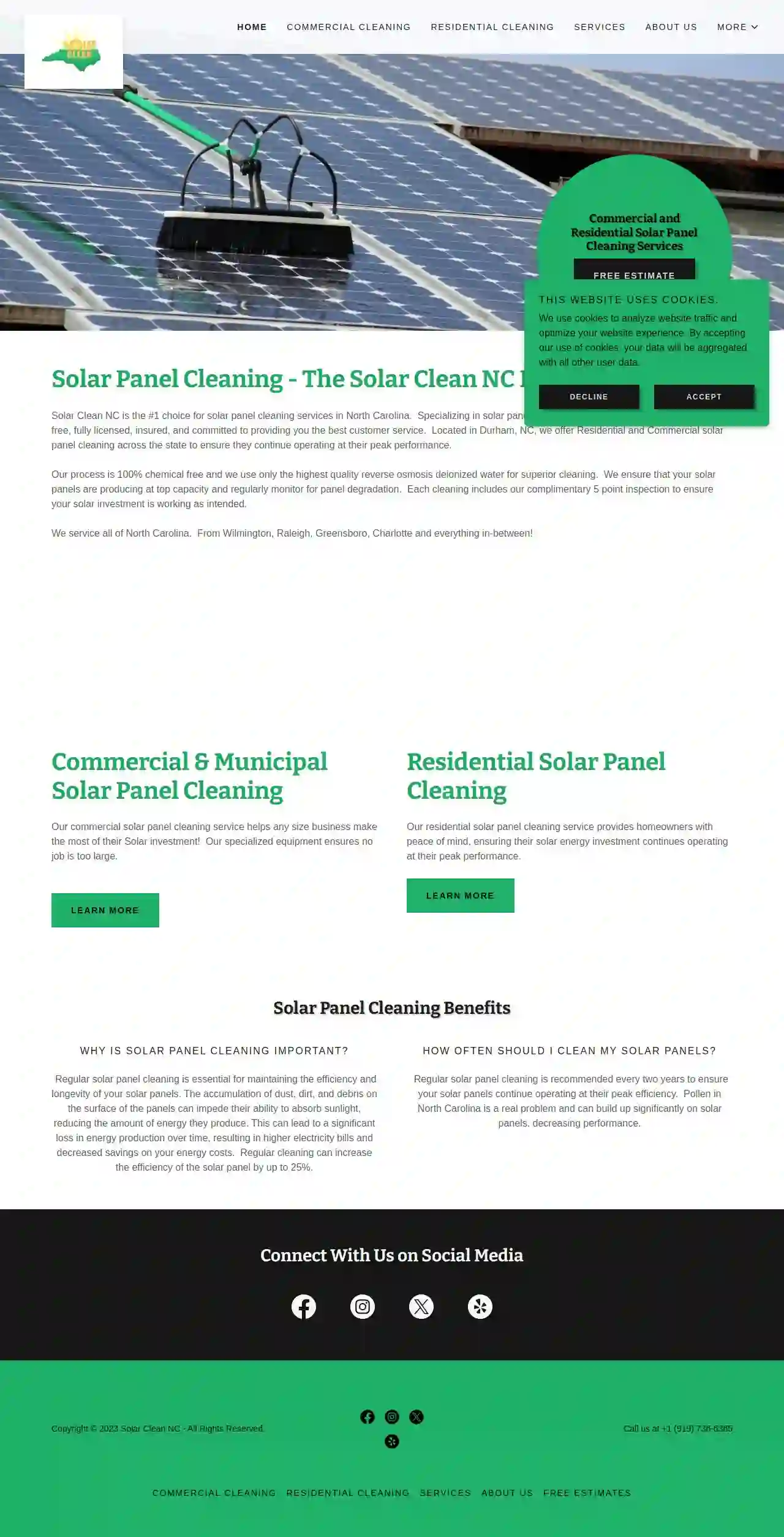
Solar Clean NC - Solar Panel Cleaning
Durham, NC, USA, 123 Solar Street, 27701, USSolar Clean NC is the #1 choice for solar panel cleaning services in North Carolina. Specializing in solar panel cleaning; Solar Clean NC is 100% chemical free, fully licensed, insured, and committed to providing you the best customer service. Located in Durham, NC, we offer Residential and Commercial solar panel cleaning across the state to ensure they continue operating at their peak performance.
- Services
- Why Us?
- Accreditations
- Our Team
- Testimonials
- Gallery
Get Quote
National Renewable Energy Corporation (NARENCO)
48 reviewsSuite A, 801 Wood Ridge Center Drive, Charlotte, 28217, USNARENCO is a leading solar company focused on developing, building, and operating utility-scale solar installations. Founded in 2009, the company has successfully partnered with leading investors and clients on groundbreaking projects. NARENCO's mission is to create long-term partnerships based on integrity, credibility, and reliability. The company's vertical integration ensures seamless management through every stage of the project lifecycle, from design to construction to operations and maintenance. NARENCO consistently delivers high-quality solar installations that revolutionize the energy market.
- Services
- Why Us?
- Accreditations
- Gallery
Get Quote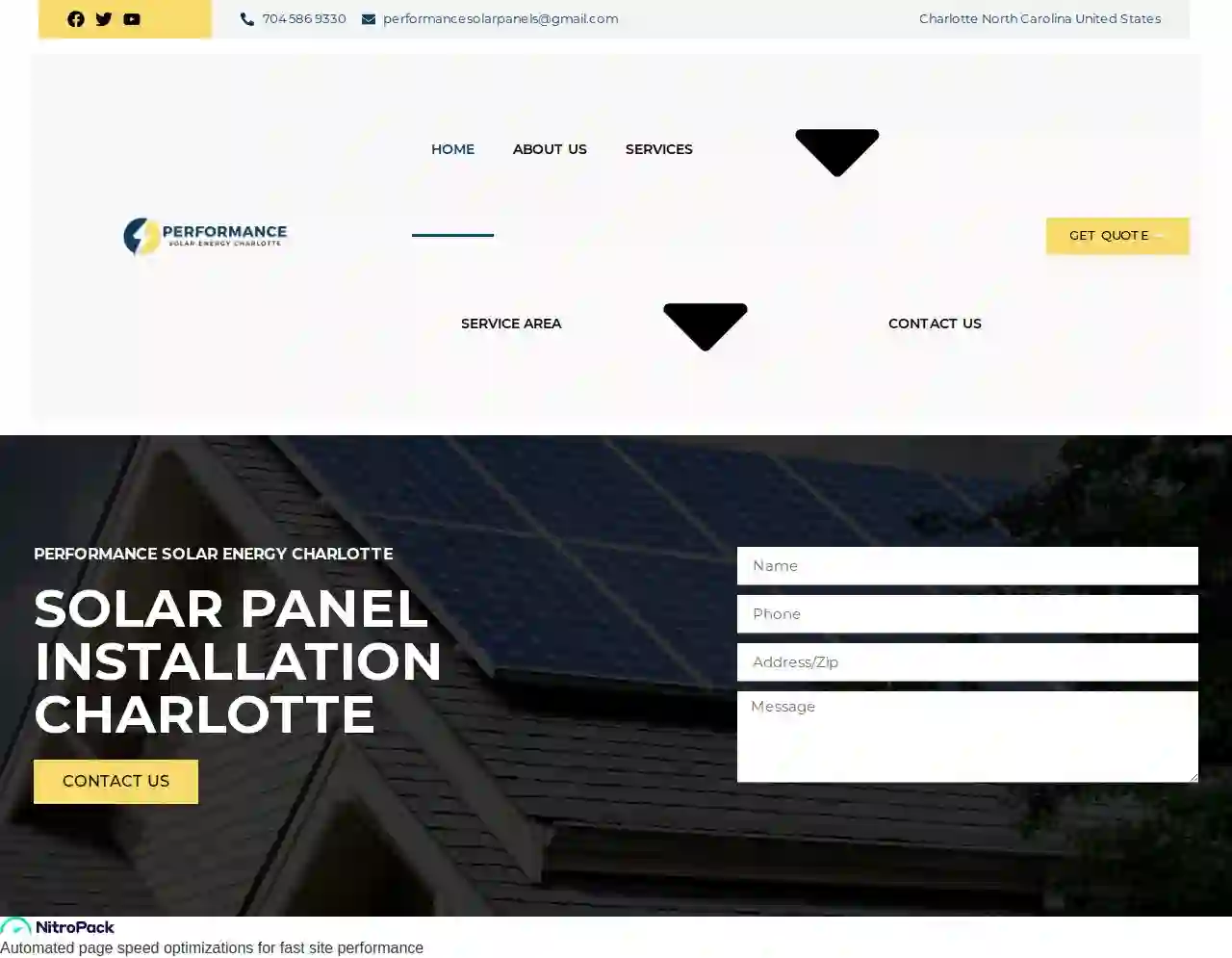
Performance Solar Energy Charlotte
59 reviewsPerformance Solar Energy, Charlotte, NC, 123 Solar Street, 28205, USPerformance Solar Energy Charlotte is a leading solar energy company in Charlotte, providing a wide range of solar energy services including solar panel installation, solar panel maintenance, and solar panel repair. With years of experience in the solar industry, our team of skilled professionals is dedicated to delivering the highest quality solar energy services to our customers. We offer a free consultation to assess your energy needs and provide a detailed proposal outlining our services. We believe solar power is the future of energy production and are committed to helping our customers save money and reduce their carbon footprint.
- Services
- Why Us?
- Accreditations
- Our Team
- Testimonials
- Gallery
Get Quote
Cooperative Solar LLC
123 Solar Street, Suite 100, Solar City, 12345, USCooperative Solar is a leading provider of solar energy solutions, dedicated to empowering communities with sustainable energy. Our mission is to make solar energy accessible and affordable for everyone. With a team of experienced professionals, we offer a range of services including solar panel installation, maintenance, and energy storage solutions. We are fully accredited and insured, with over 15 years of experience in the industry.
- Services
- Why Us?
- Accreditations
- Our Team
- Testimonials
- Gallery
Get Quote
Freedom Solar Power - Charlotte Solar Panel Installers
514 reviewsBeverly Hills, CA, 123 Solar Way, 90210, USFreedom Solar Power is a leading provider of solar energy solutions, offering installation services, cost-effective solutions, and maintenance services for both residential and commercial clients. With a strong commitment to sustainability and renewable energy, Freedom Solar Power aims to empower individuals and businesses to harness the power of the sun, reducing their reliance on traditional energy sources and contributing to a greener future.
- Services
- Why Us?
- Accreditations
- Our Team
- Testimonials
- Gallery
Get Quote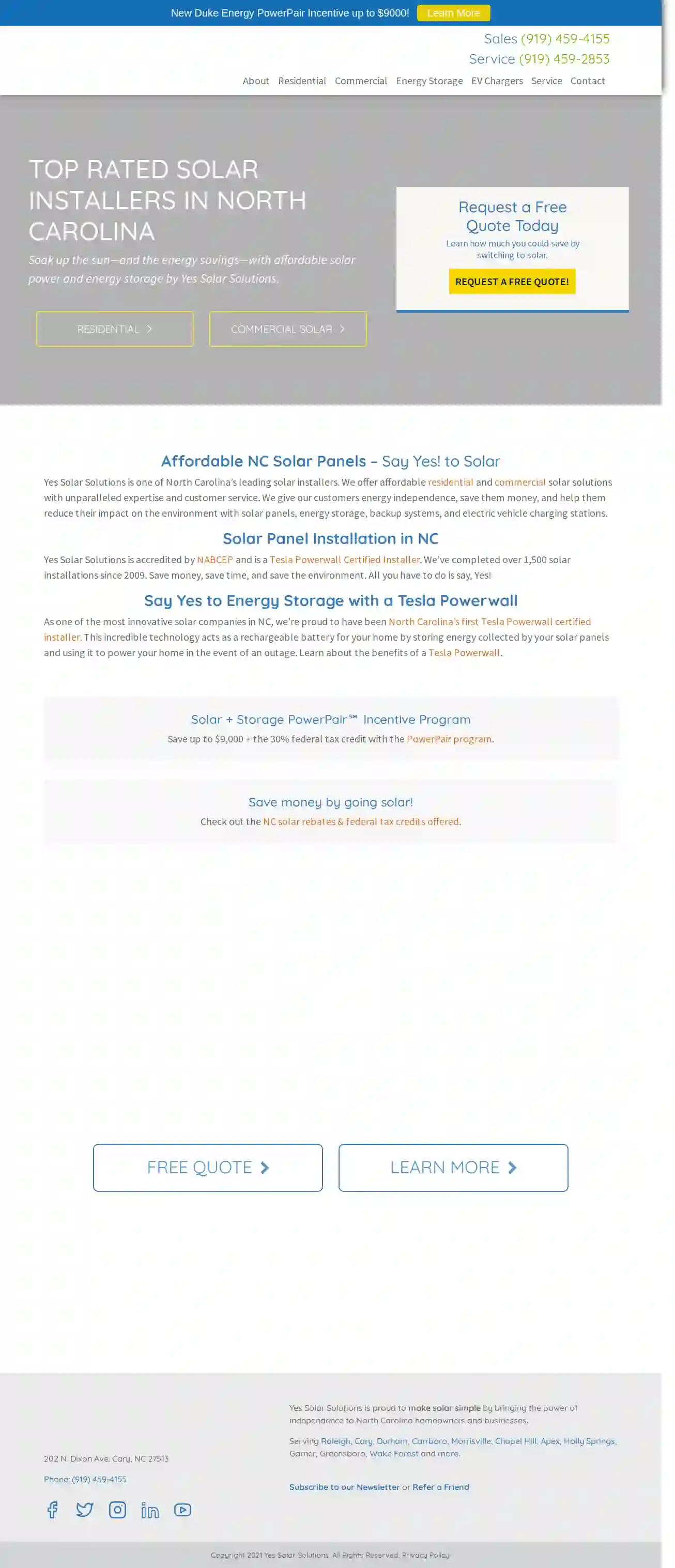
Yes Solar Solutions
4.9297 reviews202 N. Dixon Ave, Cary, NC 27513, 27513, USYes Solar Solutions is one of North Carolina’s leading solar installers. We offer affordable residential and commercial solar solutions with unparalleled expertise and customer service. We give our customers energy independence, save them money, and help them reduce their impact on the environment with solar panels, energy storage, backup systems, and electric vehicle charging stations.
- Services
- Why Us?
- Accreditations
- Our Team
- Testimonials
- Gallery
Get Quote
Over 4,210+ Solar Contractors on our directory
Our solar installers operate in Charlotte & beyond!
SolarCompaniesHub has curated and vetted the Best Solar Companies near Charlotte. Find a trustworthy pro today.
Frequently Asked Questions About Commercial Solar Installations
- System Cost: The total upfront cost of the system, including panels, inverters, installation, permitting, and other expenses.
- Energy Savings: The estimated annual savings on your electricity bill based on the projected energy production of the system.
- Incentives and Rebates: Include any applicable tax credits, rebates, or other financial incentives that reduce the net cost of the system.
- Depreciation: Factor in the depreciation value of the system over time, which can reduce your tax liability.
- Maintenance Costs: Estimate the annual maintenance costs for your solar system.
- Electricity Rate Inflation: Consider the potential increase in electricity rates over time, which will amplify your energy savings from solar.
- Uses high-quality mounting hardware
- Follows industry best practices
- Has a good understanding of roofing systems
- Ample Space: Flat roofs typically have more usable space than sloped roofs, allowing for larger solar arrays and greater energy production.
- Ease of Access: Flat roofs are generally easier to access for installation and maintenance.
- Flexibility in Orientation: Solar panels on flat roofs can be tilted and oriented in any direction to optimize sun exposure.
Can I add battery storage to my commercial solar system later?
How do I calculate the ROI of my commercial solar investment?
Will solar panels affect my roof warranty?
Can I install solar panels on a flat commercial roof?
Can I add battery storage to my commercial solar system later?
How do I calculate the ROI of my commercial solar investment?
- System Cost: The total upfront cost of the system, including panels, inverters, installation, permitting, and other expenses.
- Energy Savings: The estimated annual savings on your electricity bill based on the projected energy production of the system.
- Incentives and Rebates: Include any applicable tax credits, rebates, or other financial incentives that reduce the net cost of the system.
- Depreciation: Factor in the depreciation value of the system over time, which can reduce your tax liability.
- Maintenance Costs: Estimate the annual maintenance costs for your solar system.
- Electricity Rate Inflation: Consider the potential increase in electricity rates over time, which will amplify your energy savings from solar.
Will solar panels affect my roof warranty?
- Uses high-quality mounting hardware
- Follows industry best practices
- Has a good understanding of roofing systems
Can I install solar panels on a flat commercial roof?
- Ample Space: Flat roofs typically have more usable space than sloped roofs, allowing for larger solar arrays and greater energy production.
- Ease of Access: Flat roofs are generally easier to access for installation and maintenance.
- Flexibility in Orientation: Solar panels on flat roofs can be tilted and oriented in any direction to optimize sun exposure.